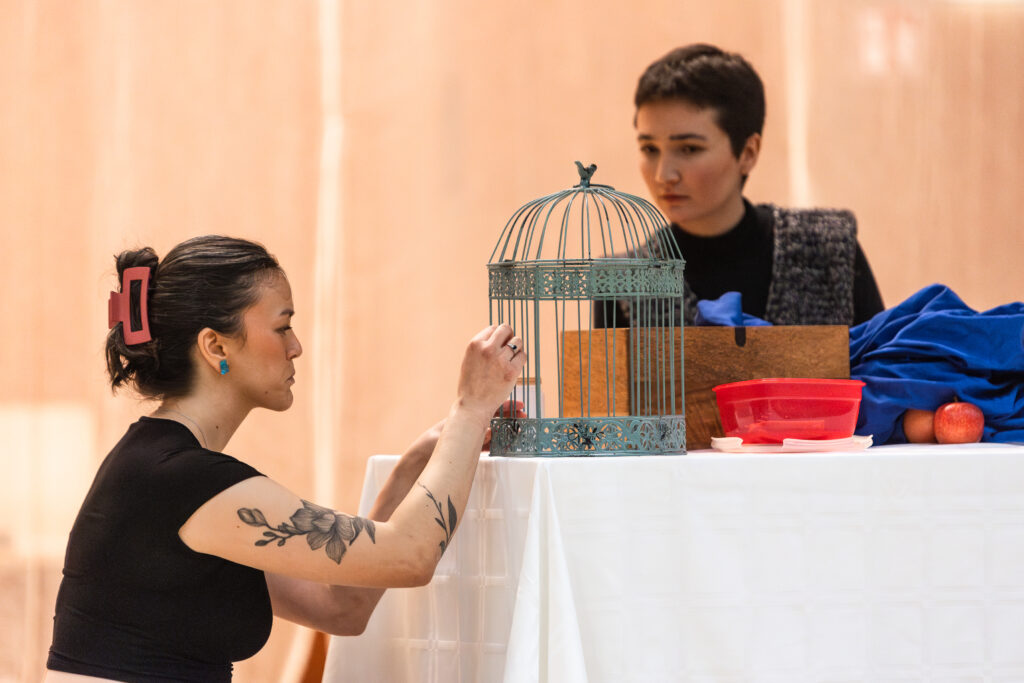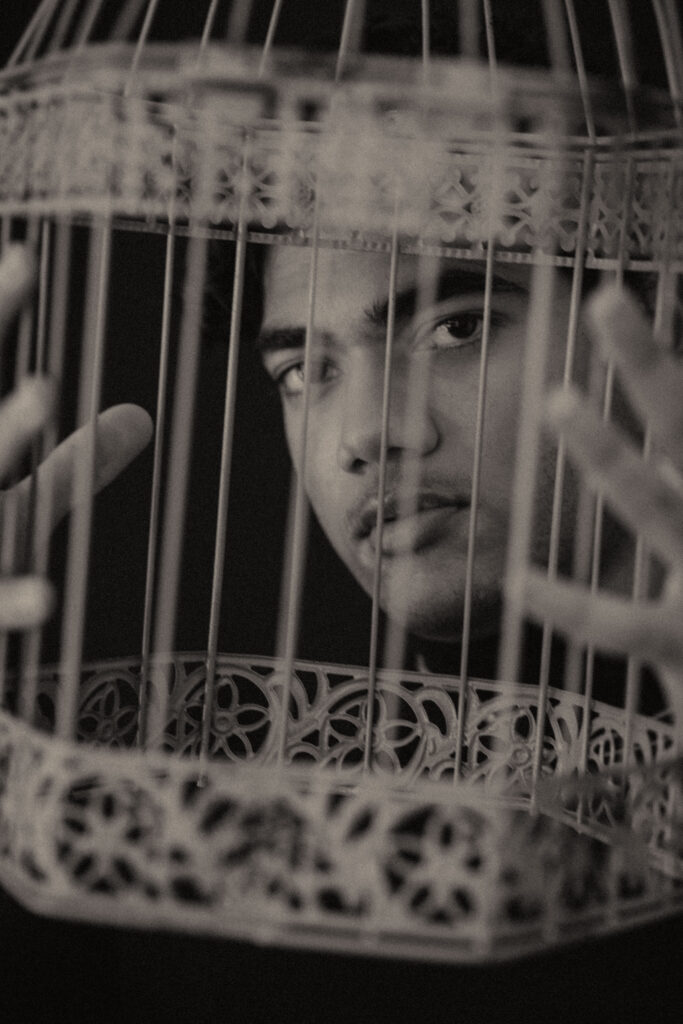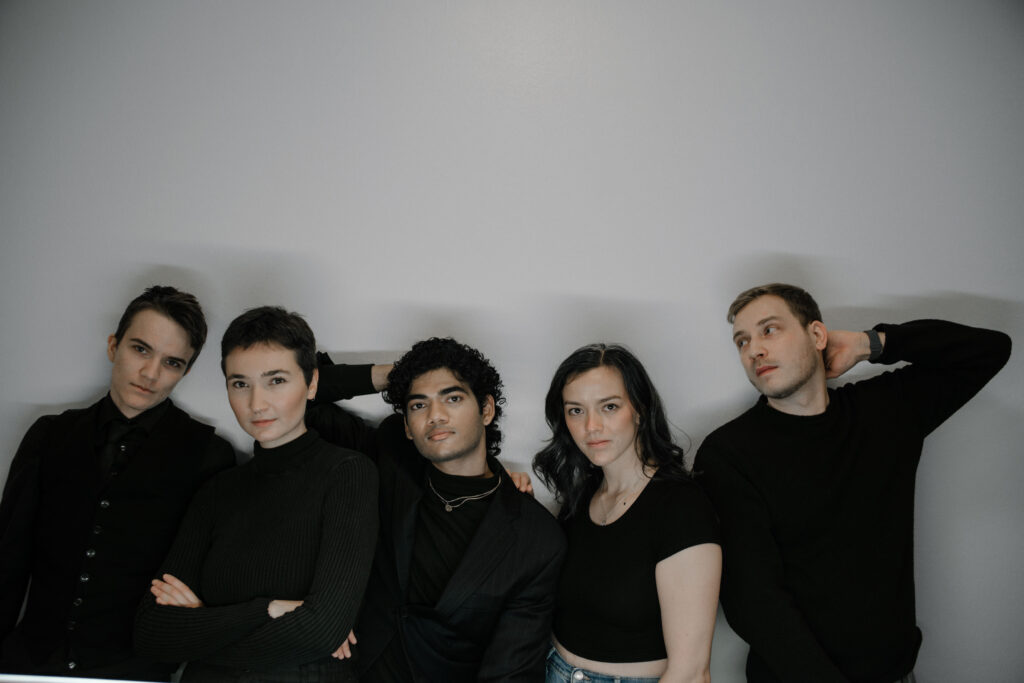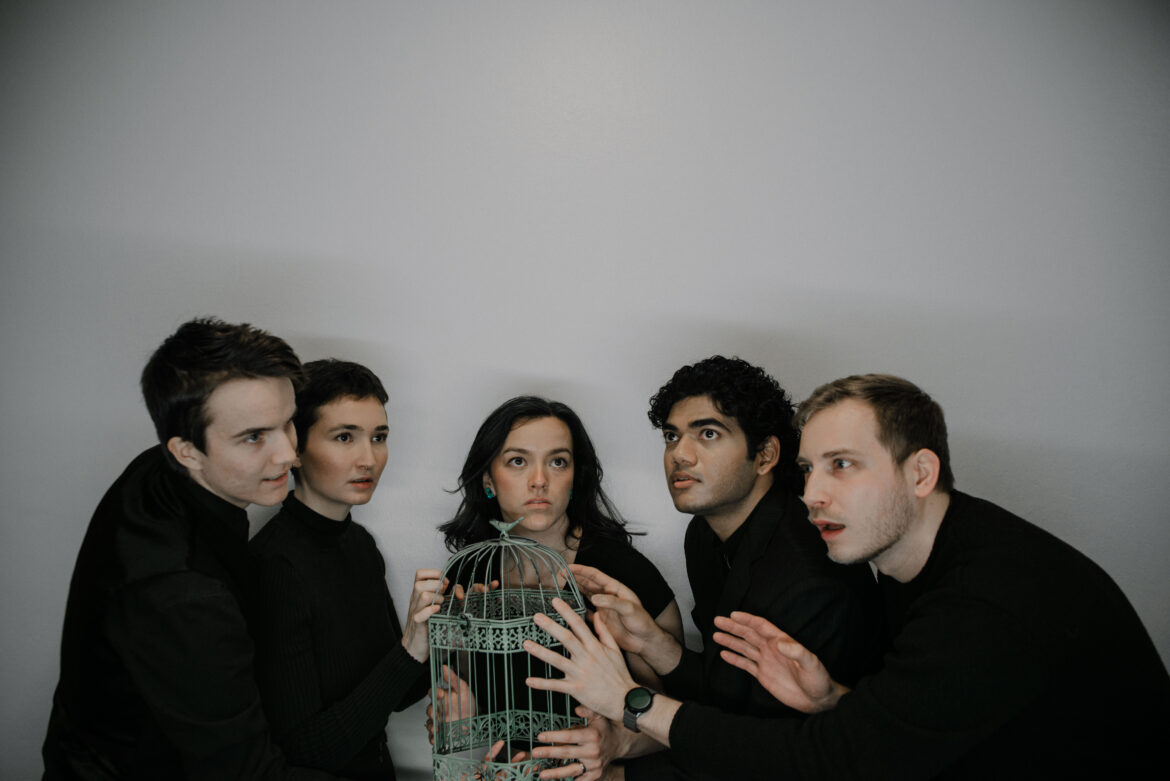By Bita Shakoori
Today is December 7 – just over a month until opening night. The University Players will do their first complete run-through of Specters. The two plays have been taking up their weekday evenings, their Saturdays, and their every waking thought. The university’s biggest lecture hall, turned stage, is fully lit and intimidating and in January, it will seat hundreds of people. For now, sparsely scattered members of the ensemble make up the audience. They are acutely alert, taking notes to share later; what works and what doesn’t. A few hours before, the air not as thick with attention, directors, crew, and cast members enter the hall. It’s cold and early. There’s work to be done.
This term’s double-bill begins with Trifles by Susan Glaspell (1916), a play about women’s role in patriarchal society and female solidarity. It deals with Mrs. Wright, who isn’t really in Trifles at all and may or may not have murdered her husband. She is the hollow center constantly being pointed at by the other characters. Director Lydia draws a parallel to the suffragette movement of the early 1900s: “The accused is not visible, because women didn’t have a voice in the public, weren’t present.”
Her absence makes Mrs. Wright and her abandoned surroundings even more important. „We thought about what kind of environment would lead to a woman snapping. It should represent her, and also this looming power of her husband.“ Directing partner Charlie says: “Mrs. Wright has her own color scheme, and she’s also a big part of our mood board; because even though she’s not there in person, she is there in spirit. The whole room is her–I mean, everything the two women find points us towards what kind of life Mrs. Wright led and what kind of person she was.”

The two women Charlie refers to are: Mrs. Hale and Mrs. Peters, who find themselves in Mrs. Wright’s kitchen, waiting for the men to finish their detective work around the house, trying to make sense of what might have happened. Helen, who plays Mrs. Hale, thinks of her character as a “strong woman,” and “more progressive than Mrs. Peters.” Drawing inspiration from some of the “MAGA women” in her family, Mrs. Peters is played by Jenny. She thinks of Mrs. Peters as the kind of woman who “really believes that women belong in the home, and women are born and bred to take care of their families, and that the greatest thing that they could possibly achieve is to be a mother.” Despite this, Jenny still thinks that her character might be jealous of Mrs. Hale. “She’s a bit younger than Mrs. Peters, she has less children, and she has more equality in the home than Mrs. Peters does.” This dissonance creates a “very cold” dynamic at first, but “even though the two are very diff erent and are very different from Mrs. Wright, they still find little things that are similarities, that kind of connect all women.”
We thought about what kind of environment would lead to a woman snapping.
Lydia Presch, co-director
This sense of connection between women is what drives the story and drives the characters to put their differences aside. Toward the end of 45-minute play, Mrs. Hale says: “I tell you it’s strange. We all go through the same things–it’s all just a different kind of same thing.” Considering this line, Jenny says: „No matter how different our lives might be, we still have to walk through the world as women. We’ve all had that moment where we know that we’re being watched, and we know we’re not totally safe.“
Charlie tells me: “You don’t need to have gone through the same experience as someone to understand their pain and to have empathy for them–that’s kind of what Mrs. Hale is saying there.” That line, Lydia says, is especially relevant today, in our time of self-centeredness and “self-optimization,” of constantly setting one’s own boundaries and ceasing to think of “us as a community.”

Another present-day connection the two directors have identified can be found in the so-called “tradwife movement” of the last couple of years. Hannah Neeleman, also known online as ballerinafarm, is arguably the epitome of this cultural shift. Charlie remembers when Hannah’s husband, JetBlue heir Daniel Neeleman, gave her an egg apron for her birthday instead of the trip to Greece she had asked for. A lot has happened in the tradwife universe since then; most recently, however, Neeleman appeared on the cover of Evie, a conservative women’s magazine described by Rolling Stone in 2023 as “a Gen Z ‘Cosmo’ for the far right.” What complicates the discourse around Hannah for many are her contributions to an oppressive system that coincide with her experiencing that very same form of oppression. This has led to very critical and very sympathetic discussions around her online persona. To Lydia, the concept of the tradwife is a sort of “counter-movement to feminism,” promising the perfect housewife, while also selling her products to her audience – “homemade sourdough, or whatever,” Lydia says. “I’ve consumed some of the media,” Helen tells me, “Me personally, I get very frustrated. The nice thing is, in the play we can channel that energy and maybe put something out that speaks against it. I think art is really powerful in that way.“
We’ve all had that moment where we know that we’re being watched, and we know we’re not totally safe.
Jenny Day, actor
Everyone at Trifles understands that this is not just a pop-cultural quirk, but a reflection of our current political landscape, in which, Lydia muses, “these kinds of narratives are not seen as right-wing ideas, but are finding their way to the center of our society.” Charlie tells me they were “already thinking about doing this play,” but when they came across that video of Hannah’s birthday, “everything kind of fell into place, and they realized how relevant this play still is today. We’re still not listening to women. We’re still disregarding their pain and their suffering, and pretend like everything’s okay.”

I ask the directing team, whether they think Mrs. Wrigh did it or not, whether it matters to know.
“She probably did it,” Lydia says in a casual tone, “I don’t think it matters. I think her story is more important than what she actually did.“ Charlie thinks what might be more important is “how the other two women deal with the knowledge that she might have done it, and their decision to protect a fellow woman, because they understand what pain she went through.” They add: „I think this idea of finding empathy for someone that’s not there, that you don’t really know–I think that’s a really vital topic, and I don’t think you need to know whether she did it to understand that.“
Foto (c) Irina Starkova


Schreibe einen Kommentar